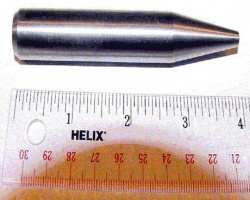Depleted uranium
(Weapon, Poison, Pollutant, Ecocide, Uranium) | |
|---|---|
 | |
| Abbreviation | DU |
| Interest of | Robert Bowman |
Depleted Uranium (DU) is a waste product of nuclear weapon production and the nuclear power industry. It is used to make armor piercing missiles (exploiting Uranium's extreme density). It aerosolises into a fine powder on impact, effectively toxifying the environment in which it is used.
Contents
Official Narrative
The health effects of such pollution are disputed.
Concerns
In November 2012, the Bulletin of Environmental Contamination and Toxicology in Heidelberg published a study that revealed that the number of congenital deformities in Basra (Iraq) had increased seven-fold between 1994 and 2003 (after the Gulf War followed by the 2003 Invasion of Iraq).[1]
Second Event Theory
Dr. Chris Busby has been a vocal critic of the official narrative that pollution by depleted uranium has negligible impact on human health, developing the Second Event Theory (SET) which suggests that such radiation is vastly more damaging than admitted - explaining the huge increase in cancer in Iraq after the attacks by the US military.
Deadly Dust
Dr Dr Siegwart-Horst Günther traveled in Iraq after the 2nd war and made his findings known in the two movies: "Der Arzt und die verstrahlten Kinder von Basra" (The doctor and the contaminated children of Basra) and "Deadly Dust" (2004 and 2007). He smuggled the remains of uranium ammunition from the Iraqi war zone to Berlin for examination, whereupon he was prosecuted for the “dissemination of radioactive material”.[2][3][4]
Cover up of health impacts
Commercially-controlled media has not paid much attention to DU as a lingering health hazard. Nafeez Ahmed[5] and others have alleged that the WHO is involved in hiding the health impacts of the use of depleted uranium.
Related Quotation
| Page | Quote | Author | Date |
|---|---|---|---|
| Fallujah | “The pictures flash up on a screen on an upper floor of the Fallujah General Hospital. And all at once, Nadhem Shokr al-Hadidi's administration office becomes a little chamber of horrors. A baby with a hugely deformed mouth. A child with a defect of the spinal cord, material from the spine outside the body. A baby with a terrible, vast Cyclopean eye. Another baby with only half a head, stillborn like the rest, date of birth 17 June, 2009. Yet another picture flicks onto the screen: date of birth 6 July 2009, it shows a tiny child with half a right arm, no left leg, no genitalia. "We see this all the time now," Al-Hadidi says, and a female doctor walks into the room and glances at the screen. She has delivered some of these still-born children. "I've never seen anything as bad as this in all my service," she says quietly.” | Robert Fisk | April 2012 |
Related Documents
| Title | Type | Publication date | Author(s) | Description |
|---|---|---|---|---|
| Document:The Kiss of Death | article | 2005 | Leuren Moret | Insight into where privatisation of the US Nuclear weapons program and military/weapons/surveillance developments are leading the world. It also provides shocking information about the extent of the apparently quite deliberate and calculated radiation contamination resulting from ever-expanding use of depleted uranium munitions. |
| File:Birth Defects In Iraq.pdf | report | 16 September 2012 | M. Al-Sabbak S. Sadik Ali O. Savabi G. Savabi S. Dastgiri M. Savabieasfahani |
References
- ↑ https://en.qantara.de/content/depleted-uranium-munitions-in-iraq-deadly-dust-falls-in-silence saved at Archive.org saved at Archive.is
- ↑ https://www.zeit-fragen.ch/en/archives/2015/no-34-13-february-2015/on-the-death-of-professor-dr-dr-siegwart-horst-guenther.html saved at Archive.org saved at Archive.is
- ↑ https://rotefahne.eu/2012/02/siegwart-horst-guenther-arzt-antifaschist-jude-und-mutiger-mahner/ saved at Archive.org saved at Archive.is
- ↑ https://www.uranmunition.org/nachruf-prof-siegwart-horst-guenther/ saved at Archive.org saved at Archive.is
- ↑ http://insurge.net/2013/10/13/how-the-world-health-organisation-covered-up-iraqs-nuclear-nightmare-nafeez-ahmed-environment-the-guardian/